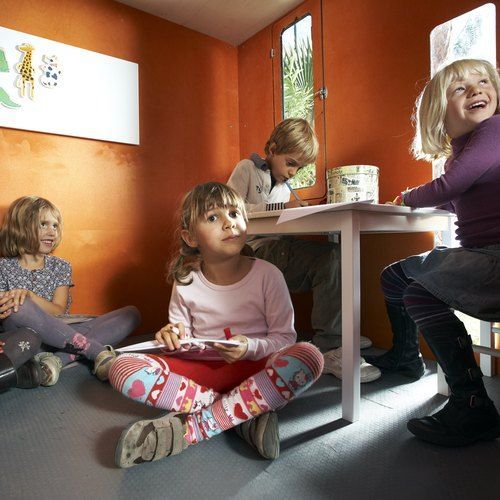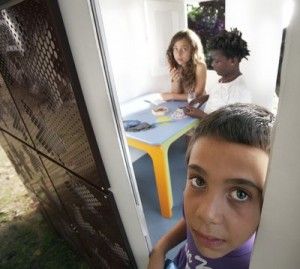
 The children’s playhouses are a very good way to encourage autonomous playing, which is so important during childhood. The culture of autonomous learning originated in the Anglo-Saxon and Nordic cultures, where children’s playhouse in the garden are very common.
The children’s playhouses are a very good way to encourage autonomous playing, which is so important during childhood. The culture of autonomous learning originated in the Anglo-Saxon and Nordic cultures, where children’s playhouse in the garden are very common.
With the SmartPlayhouse playhouses the children can enjoy their free playtime displaying their attitudes, desires and beliefs while stimulating their physical, affective, social and cognitive development. This non-directed playtime also encourages team-work, decision-making, conflict resolution, role-playing and finally the necessary aptitudes for a good future development in the society that surrounds them.
From 2 to 7 years, symbolic playing
In this stage the child acquires the skill of representation and adopts a series of roles where shared norms, in an indirect way, bring them to exteriorize their fears, beliefs and thoughts. In other words, they start to discover what they are interested in, showing a motivation and implication in what they are doing.
Physical resources have a very important psychological role which contributes to the learning, development, growth and maturity of the child. With the SmartPlayhouse playhouses the children have the opportunity to imitate actions as if they were real.
From 7 years old, the need for their own space
Providing children with a SmartPlayhouse playhouse gives them the opportunity to feel responsible for their own space, encouraging autonomy, which they will develop progressively. This includes learning the norms which will bring them to, among other things, know how to share with others, keep the house tidy and enjoy their privacy, etc.
The SmartPlayhouse playhouses encourages playing, a hugely important activity in their learning, as it provides a familiarity with the language and a series of social relationships which will give the children more autonomy and a constructive life with others.
Written by Vanessa López Guzman, Graduate in Child Education and Educational Psychology, and David Lamolla i Kristiansen
To learn more:
Ovide Decroly (Psychologist). Studies the huge importance of playtime in the development of mental functions as it helps develop skills in attention, retention and understanding.
Jean Piaget (Psychologist). Carried out a large study on the relationship between the mental structure and playtime activity, explaining, among other things, that we learn through play.
Maria Montessori Renowned Educational Scientist, Psychologist and Philosopher. Supports the fact that playing is a way of learning and enriching a person.

Leave a Reply